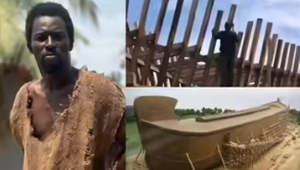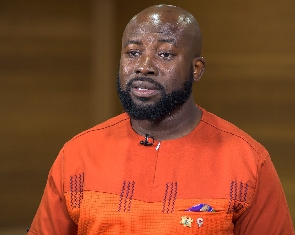As a Climate Enthusiast and Environmentalist with academic training in natural resources management, renewable energy resources, and local ecological knowledge (ethnobotany), my heart badly aches and bleeds for not only the destroyed water bodies, habitats, and rich biodiversity of various species but also the worsening health of the people living in and out of the affected mining Regions of Ghana.
I organized a scientific workshop on the Galamsey matter in Ghana at the annual Tropentag conference in Berlin this year in September as well as discussing this complex environmental issue with MSc. Students in Germany and the usual traditional solutions were proposed. More needs to be done before our nation is completely consumed by this environmental cancer!
The generational consequences of the prevailing unchecked galamsey operations in Ghana may very soon devour the country if care is not taken to halt it now in the face of the global climate crisis!
What we are experiencing now as a developing nation in the area of small-scale mining is no longer the typical ‘Galamsey’ (illegal artisanal or small-scale gold mining) known for years in Ghana. I term this new form of Galamsey as ‘High-Tech Galamsey’(HTG).
In this context, I define HTG as a disguised form of ‘kalabule’ small-scale gold mining by employing high-tech or earth-moving machinery to excavate and obliterate the natural environment including waterbodies, habitats, forest reserves, and biodiversity with careless abundance and no mining license to operate in Ghana.
Galamsey, as we all know, has been with us for several generations of our nationhood and done in such a way that major rivers and forest reserves of our country are not destroyed unlike what we are seeing today.
Sadly, the current HTG practice is the opposite and highly detrimental to water bodies, forest reserves, biodiversity, and food production which has food insecurity and water scarcity implications.
For me, the concomitant social, economic, political, and environmental issues are not just resulting from the known Galamsey itself but rather the HTG operations with the potential to engulf our nation and devour future generations in the country after this inept NPP government is gone next year.
The deliberate natural balance of ecosystems functioning, or provisioning services and humans is designed to ensure coexistence and sustainable nature.
To dovetail into my critical take on this worrying and heart-wrenching national issue of environmental menace, I will laconically itemize some core drivers of the worsening HTG in Ghana as well as suggest pragmatic or not business-as-usual (BAU) measures to engender further public discourse on the matter.
Before that, let me touch briefly on the known social, health, economic, and environmental problems of mining and a bit of historical mining perspective in Ghana.
Mining of any form, be it regulated or illegal form of mining has the above-mentioned inherently problematic issues such as social vices, unhealthy population, habitat and biodiversity loss, water pollution, and other environmental consequences to handle. I will suggest you read further on some peer-reviewed research papers on small-scale mining operations in Ghana such as Bansah et al. (2018), Danyo and Osei-Bonsu (2016), Yeboah (2023), Akudugu et al. (2013) and elsewhere in Peru (Espin, 2023).
I completely agree with Armah who said that mercury contamination of our surface water bodies through the operations of (illegal)small-scale gold mining is a wicked socio-environmental problem (Armah, 2013).
Historically, Ghana has a long history of mineral resource extraction, be it with mechanized large-scale mining or small-scale mining, as part of its political economy, which has been traced as far back as the nineteenth century (see Bebbington et al., 2018). Let’s now look at the core drivers of this wicked socio-environmental problem facing the country.
THE KEY DRIVERS OF WORSENING HTG IN GHANA
Although there is a myriad of explanatory variables that are contributing to the raging and worsening HTG operations under the Akufo-Addo-Bawumia-led regime, I have identified four key drivers for the worsening and wicked prevailing socio-environmental tragedy in Ghana.
Leadership lacuna
The first driver is a huge leadership lacuna as this current government lacks the political will and commitment to the HTG fight. This lack of political will to confront this wicked problem by this government has permeated into the local leaders thereby making them powerless or implicit in this environmental menace. Sadly, President Akufo-Addo has indeed failed Ghanaians by looking on helplessly at the HTG devastation going on unabated, after he put his President on the line.
Frightening greed
The second driver is frightening greed at high places like the ‘Presidential Galamseyers’ captured in Prof. Frimpong-Boateng’s report on Galamsey activities. This unchecked greed among Ghanaians and foreigners from China including other African nationals will spell doom for our nation if care is not taken now.
Thus, the disproportionate greed exhibited by the current High-Tech Galamseyers is indeed worrying and unacceptable as their deliberate actions are devouring the future generations of the country.
Lack of environmental consciousness among Ghanaians
The third major driver of this alarming environmental problem is the lack of environmental consciousness among Ghanaians. People don’t care about the natural environment which provides us with all kinds of ecosystem services including clean air, water, and food for our survival. Without these vital resources, humans cannot survive on Earth!
Worsening economic conditions and joblessness among the youth
The fourth driver of the raging HTG operations is attributable to the worsening economic conditions and joblessness among the youth who are seeking refuge in the HTG activities to survive. The Akufo-Addo-Bawumia-led regime has woefully indeed disappointed the teeming Ghanaian youth by not providing sustainable jobs for them.
This youth unemployment is a time bomb and must be addressed immediately. The 24-Hour Economy Policy Proposition by the Flagbearer of the NDC Party, John Dramani Mahama is the right way to go!
WHAT NEEDS TO BE DONE BUT NOT BAU:
To be able to better confront the socio-environmental problems of the HTG operations, we need to embark on taking pragmatic steps but not the BAU rhetorics such as the ‘offline’ President Akufo-Addo’s promise, poorly supervised community mining initiative, ineffective legal regime, etc.
I hereby propose that the public discourse on the worsening HTG menace must be done in a sustained manner to get the desired results as a sovereign nation by considering the following:
1. Citizens demand for political action: Citizens must demand for President Akufo-Addo to walk his talk to address the HTG menace, or he quits as President!
2. Complete ban of HTG activities: Complete ban of all forms of small-scale gold mining operations including HTG now!
3. The Anas Principle: This efficacious Investigative Principle of Anas should be revived to fish out all nation wreckers engaging in HTG operations for future prosecutions. President Akufo-Addo promised to use it to fight corruption, but it never happened.
4. Environmental campaigns: Environmental campaigns on the life-threatening impacts of HTG operations via music and videos should be produced and shown to people nationwide.
5. Curbing Greed: Greedy Culprits using the devastating HTG technique enrich themselves only be legally dealt with swiftly.
6. Media boycott: Media boycott of current political discussions and only focus on HTG matters until President Akufo-Addo is moved to fix the HTG mess under his watch.
7. Bottom-up approach: Locals’ ownership of the HTG fight using bottom-up approach i.e. from community to the national level.
8. 24 Hour Economy Policy Proposition: Uing this proposed economic policy by the NDC will indirectly tackle this HTG menace by addressing the four key drivers stated above, especially providing sustainable and well-paying jobs for the teeming youth.
In conclusion, of all the mediation measures suggested, leadership is the cause and all others are the effect. Nothing will work without committed political and traditional leadership to tackle the HTG fight.
The generational woes and heart-wrenching impacts of the HTG menace under the Presidency of President Akufo-Addo and supported by Dr. Mahamudu Bawumia on this HTG fight is likely to be the worst government to remember in our Fourth
Republican dispensation.
Nana Addo Danquah Akufo-Addo merely put his Presidency on the line on this matter to win votes in 2020 and later turned around to perform so abysmally in his efforts to deal with the menacing HTG. Ghanaians deserve better than this!
Further reading sources:
Armah, F.A. (2013). Artisanal Gold Mining and Mercury Contamination of Surface Water as a Wicked Socio-Environmental Problem: A Sustainability Challenge? Conference Paper. DOI: 10.3390/wsf3-a002
Bansah, K.J., N.K. Dumakor-Dupey, B.A. Kansake, E. Assan, P. Bekui (2018). Socioeconomic and environmental assessment of informal artisanal and small-scale mining in Ghana. Journal of Cleaner Production 202 (2018) 465e475. https://doi.org/10.1016/j.jclepro.2018.08.150
Bebbington, A. Abdulai, A.G., Bebbington, D.H., Hinfelaar, M., Sanborn, C.A., Achberger, J., Huber, C.G., Hurtado, V., Ramírez, T., Odell, S.O. (2018). Competitive Clientelism and the Political Economy of Mining in Ghana. Governing Extractive Industries: Politics, Histories, Ideas. Pages 152–196 https://doi.org/10.1093/oso/9780198820932.003.0005
Danyo, G. and Osei-Bonsu, A. (2016). Illegal Small-Scale Gold Mining in Ghana: A Threat to Food Security. Journal of Food Security, 2016, Vol. 4, No. 5, 112-119. Available online at http://pubs.sciepub.com/jfs/4/5/2
Yeboah, A. S. (2023). Digging Deeper: The Impact of Illegal Mining on Economic Growth and Development in Ghana. Paper No. 117641. Online at https://mpra.ub.uni-muenchen.de/117641/MPRA
Akudugu, M.A., Mahama, E.S., Atami, E.H. (2013). The welfare impact of small-scale mining in the Talensi–Nabdam District of Ghana. A quantitative approach. Miner Econ (2013) 25:97–106. DOI 10.1007/s13563-012-0022-0
Espin, J. (2018). Legal but Environmentally Harmful Practices Involved in Gold Mining in Madre de Dios, Peru. Critical Criminology (2023) 31:563–579. https://doi.org/10.1007/s10612-023-09685-w
Opinions of Saturday, 9 December 2023
Columnist: John-Baptist Naah















